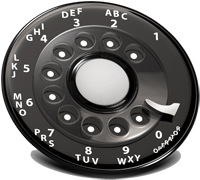I was talking to a friend, Jake, recently when the phone rang. When the caller id displayed the name I heard him say “I bet Steve just lost his job.” When I asked how he knew that he responded “Steve only calls me when he’s looking for a job.”
Oooh, that hurt because the reason I had asked to meet with him was to let him know that I was going to start a job search and wanted to see if he knew of any opportunities. Ok, unfortunate timing. Then I quickly tried to recall how many times I had talked to him over the past year.
Three.
There was that time I asked if he knew of any designers looking for a job. Then a couple of months ago I wanted to get feedback on an idea I had and then this meeting. Each of our encounters had a purpose – in economic terms Jake afforded utility.
But Jake was supposed to be a friend not an appliance I used to get something done. Yet when I looked back on nearly all of our encounters they were for the direct purpose of getting something done.
My pastor once repeated the often quoted phrase that “if you want to know where someone’s heart is look at their checkbook.” I have a variation on that theme.
When is the last time you called someone without a purpose other than to see how they were – I mean with no other motive or objective? When is the last time you randomly  decided to call someone because you just wanted to let them know they were on your mind?
decided to call someone because you just wanted to let them know they were on your mind?
I suspect any of the guys out there are going “Dude, that is too touchy feely for me.” If that’s your thought then you obviously have never received a call like this. If you had, you would realize what an amazingly powerful effect it has on your relationship.
My wife has a friend, Bridgette, that makes these types of calls all the time. It leaves an incredible impression on Beth. Just think, someone thought of her and dared to step out on a limb to call knowing that she had nothing she wanted other than to connect.
If you are still having trouble with this being to touchy feely consider Stephen Covey’s concept of a human’s “emotional bank account”, a place where others can make deposits and withdrawals. Asking for favors, taxing another with your problems are examples of withdrawals. Helping, listening and just being there for someone in their time of need are ways to make a deposit. The key is that just like a typical bank account you hope to always have enough in your friend’s account to cover any adverse situations. Should either account go in the red the bank and your friend are likely to close them. A simple call for no reason makes a very large deposit with very little investment.
Today’s Challenge
Good: Right now, no excuses, call someone. I know you have the time as you just took 5 minutes to read this column. Pick up the phone and say “Hey Jim, I don’t need anything. I was just thinking of you and wanted to see how you are doing.” Tell me what happens.
Better: Get out your calendar and add 1 friend per day to your call list. Set aside a regular part of the day and do it.






